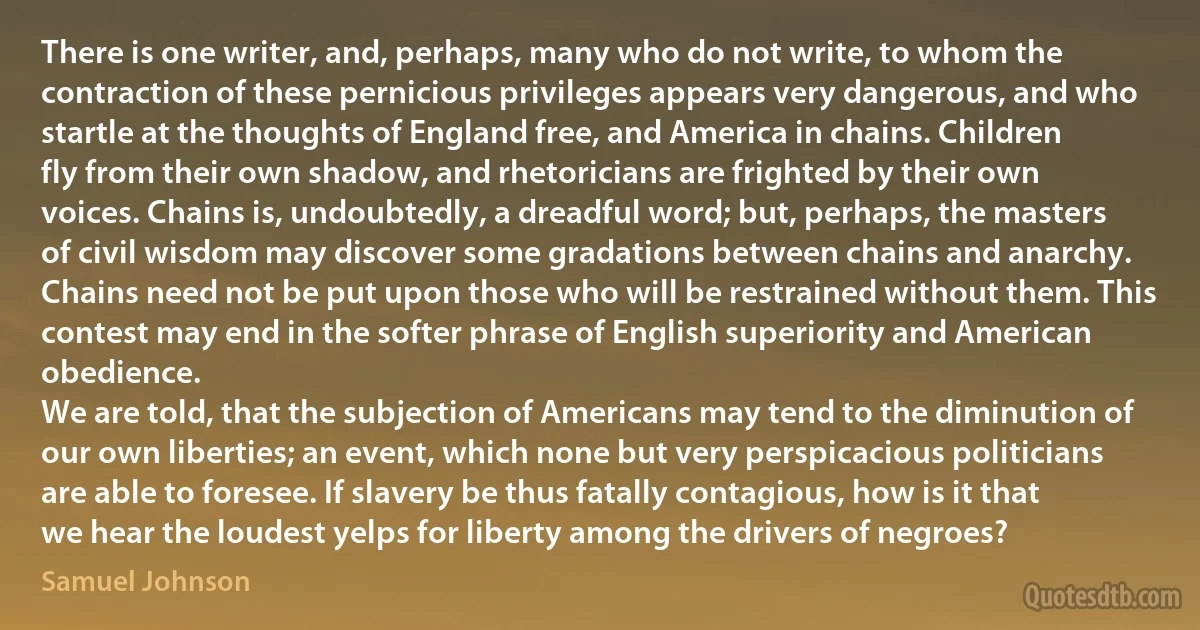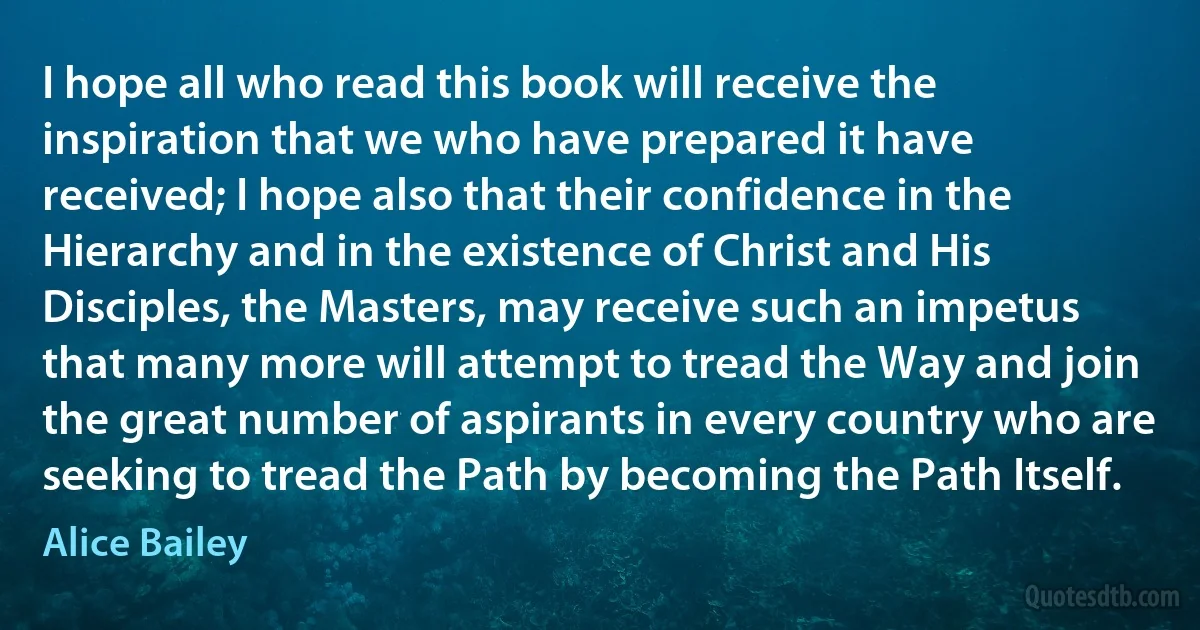Masters Quotes - page 25
We call them "Masters” because they are our teachers; and because from them we have derived all the Theosophical truths, however inadequately some of us may have expressed, and others understood, them. They are men of great learning, whom we term Initiates, and still greater holiness of life. They are not ascetics in the ordinary sense, though they certainly remain apart from the turmoil and strife of your western world.

Helena Petrovna Blavatsky
The Tibetan Master Djwhal Khul... between 1919 and 1949... dictated, by mental telepathy, a series of 19 books through Alice A. Bailey. (Bailey herself wrote five additional volumes.) These 19 very profound, and to my mind very practical, teachings are the intermediate phase of the teachings given out by the Masters for the new age of Aquarius now beginning. The Secret Doctrine was the preparatory phase of the teachings, given through Madame [Helena Petrovna ] Blavatsky, who lived and worked for some years with a group of Masters in the Himalayas. One of them was the Master Morya, her own Master, and another the Master Koot Hoomi, both very advanced Masters. These two Masters are deeply involved with humanity and, with the Master Jesus...

Helena Petrovna Blavatsky
She was a splendid pianist, playing with a touch and expression that were simply superb. Her hands were models-ideal and actual-for a sculptor and never seen to such advantage as when flying over the keyboard to find its magical melodies... There were times when she was occupied by one of the Mahâtmas, when her playing was indescribably grand. She would sit in the dusk sometimes, with nobody else in the room beside myself, and strike from the sweettoned instrument improvisations that might well make one fancy he was listening to the Gandhâvas, or heavenly choristers. It was the harmony of heaven...she was loyal to the last degree to her aunt, her other relatives, and to the Masters; for whose work she would have sacrificed not only one, but twenty lives, and calmly seen the whole human race consumed with fire, if needs be.

Helena Petrovna Blavatsky
Madame Fadeeff: "She was well brought up, well educated as a woman of the world, that is to say, very superficially. But as to serious and abstract studies, the religious mysteries of antiquity, Alexandrian Theurgy, ancient philosophies and philologies, the science of hieroglyphs, Hebrew, Samskrit, Greek, Latin, etc., she never saw them even in a dream. I can swear to it. She had not the least idea of the very alphabet of such things.... my niece spoke to me about them (the Masters of Wisdom), and that very fully, years ago. She wrote to me that she had seen and reknitted her connection with several of them before she wrote her Isis. Why should she have invented these personages? With what object ? and what good could they do her if they did not exist? Your enemies are neither wicked nor dishonest, I think; they are, if they accuse you of that, only idiotic.

Helena Petrovna Blavatsky
What I fear I have seen in the run-up to the Iraq War in this country is the politicization of intelligence to fit the political intentions of our masters. And to my mind, that was a terrible moment in the history, the visible history, of intelligence work in this country, where the intelligence service itself became effectively co-author and signatory to the so-called dodgy dossier, which - on the strength of which Colin Powell was able to present a dire picture of the threat from Iraq, which turned out to be untrue.

John le Carré
I don't think that we are a species or a people that can exist without making mistakes somewhere along the line. Some make mistakes that are greater than others. But I do believe that we should have the courage and the ability to look at something that we did, even if in the first instance we believed it, when in the wake of the aftermath and the truth, you find out that that was not the case, to then say, 'Let me go back and examine what led me to this conclusion. What gods was I serving? What masters was I serving? What was it all about?' and then try to be more instructive to people who will listen to you.

Harry Belafonte
Patanjali was a compiler of teaching which, up to the time of his advent, had been given orally for many centuries.... The Yoga Sutras are the basic teaching of the Trans Himalayan School to which many of the Masters of the Wisdom belong, and many students hold that the Essenes and other schools of mystical training and thought, closely connected with the founder of Christianity and the early Christians, are based upon the same system... the Sutras have [xvi] been dictated and paraphrased by the Tibetan Brother and the commentary upon them has been written by myself, and subjected to revision and comment by the Tibetan.

Alice Bailey
This book is in many ways unique. Nothing like it has before been published, as far as I know. It contains two series of talks by one of the Masters of the Wisdom to some members of His inner group, and also a series of personal instructions, given by Him to a group of His disciples. Many of these people were unknown to me when they were brought to my notice; some of them I have since met; others I have never met; some I knew well and could understand why they had been chosen, knowing that their dedication to the life of the spirit and their love of humanity warranted the choice; one or two were regarded by me as most unsuitable choices but later I altered my point of view and recognised that a wiser mind than mine was responsible for their inclusion in the Ashram. I learnt also that ancient relationships, established in other lives, were also conditioning factors and that some had earned the right to inclusion, even if their spiritual attainments seemed inadequate to the onlooker.

Alice Bailey
The German Romantics had to destroy the same bastions we do. Logocentrism and idealism, theology, all supports of the repressive society. Property's pillars. Reason which always homogenizes and reduces, represses and unifies phenomena or actuality into what can be perceived and so controlled. The subjects, us, are now stable and socializable. Reason is always in the service of the political and economic masters. It is here that literature strikes, at this base, where the concepts and actings of order impose themselves. Literature is that which denounces and slashes apart the repressing machine at the level of the signified.

Kathy Acker
The poster first of all justified its existence on the grounds of utility, and should it further aspire to beauty of line and colour, may not our hoardings claim kinship with the galleries, and the designers of affiches pose proudly in the public eye as the masters of Holland Road or Bond Street Barbizon (and, recollect, no gate money, no catalogue)?

Aubrey Beardsley
You, masters of the earth – princes, kings, emperors, powerful majesties, invincible conquerors – simply try to make the people go on such-and-such a day each year to a given place to dance. I ask little of you, but I dare give you a solemn challenge to succeed, whereas the humblest missionary will succeed and be obeyed two thousand years after his death. Every year the people gather around some rustic temple in the name of St John, St Martin, St Benedict, etc.; they come, animated by a feverish and yet innocent eagerness; religion sanctifies their joy and the joy embellishes religion; they forget their troubles; on leaving they think of the pleasure that they will have on the same day the following year, and the date is set in their minds.

Joseph de Maistre
Being the Avatar, I have come to awaken mankind, and would like the entire world to come to me. Real saints are dearest and nearest to my heart. Perfect Ones and lovers of God adorn the world, and will ever do so. The physical presence of the Perfect Masters throughout eternity is not necessarily confined to any particular or special part of the globe. My salutations to all - the past, present and future Perfect Masters, real saints - known and unknown - lovers of God, and to all other beings, in all of whom I reside, whether consciously felt by them or not.

Meher Baba
As a consequence of this the men on strike are believed by millions of people who know nothing of the facts to be wild, riotous, drunken, worthless scamps, whereas the very opposite is the truth. The military and police have been sent to help the masters to crush the men. The trick won't succeed.

Keir Hardie
In the second part of the Phaedrus Plato attempts to clarify the nature of "true” rhetoric. ... it does not arise from a posterior unity which presupposes the duality of ratio and passio, but illuminates and influences the passions through its original, imaginative characters. Thus philosophy is not a posterior synthesis of pathos and logos but the original unity of the two under the power of the original archai. Plato sees true rhetoric as psychology which can fulfill its truly "moving” function only if it masters original images [eide]. Thus the true philosophy is rhetoric, and the true rhetoric is philosophy, a philosophy which does not need an "external” rhetoric to convince, and a rhetoric that does not need an "external” content of verity.

Ernesto Grassi
I see that you are in fears again from your White Boys, and have destroyed a good many of them; but I believe, that if the military force had killed half as many landlords, it would have contributed more effectually to restore quiet. The poor people in Ireland are used worse than negroes by their Lords and Masters, and their Deputies of Deputies of Deputies. For there is a sentiment in every human breast that asserts man's natural right to liberty and good usage, and that will, and ought to rebel when oppressed and provoked to a certain degree.

Philip Stanhope, 4th Earl of Chesterfield
Nothing is easier than to falsify the past. Lifeless instruction will do it. If you rob it of vitality, stiffen it with pedantry, sophisticate it with argument, chill it with unsympathetic comment, you render it as dead as any academic exercise. The safest way in all ordinary seasons is to let it speak for itself: resort to its records, listen to its poets and to its masters in the humbler art of prose. Your real and proper object, after all, is not to expound, but to realize it, consort with it, and make your spirit kin with it, so that you may never shake the sense of obligation off. In short, I believe that the catholic study of the world's literature as a record of spirit is the right preparation for leadership in the world's affairs, if you undertake it like a man and not like a pedant.

Woodrow Wilson
The citizens of Mississippi within the limits above described, are called upon to pursue their peaceful avocations, in obedience to the laws of the United States. Whilst doing so in good faith, all the United States forces are prohibited from molesting them in any way. It is earnestly recommended that the freedom of Negroes be acknowledged, and that, instead of compulsory labor, contracts on fair terms be entered into between the former masters and servants, or between the latter and other persons who may be willing to give them employment. Such a system as this, honestly followed, will result in substantial advantages to all parties.

Ulysses S. Grant
You compare Cardozo with Spinoza; but as far as I can judge by your book there is no intellectual comparison. Spinoza was not soft. I have been all my life long a fervent disciple of Spinoza precisely on account of his firmness, of his uncompromising naturalism. Yet even he leaves out the three traditions which, however false their cosmology, seem to me morally sound: the Greek, the Catholic, and the Indian. I am therefore not a disciple of Spinoza in his ideal of human life: It leaves out poetry, art, traditional religion, military and constructive patriotism. His society would be a tame society, where there would be no masters, but all would be voluntary slaves. Perhaps you feel something of my difficulty when you point out that "art" is an indispensable ingredient in everything human.

Baruch Spinoza
I studied a good deal in the museum at Naples; the Pompeian paintings are extremely interesting from every aspect. So I am staying in the sun – not to paint portraits but while I am warming myself and looking hard at things I hope I will have acquired some of the grandeur and simplicity of the old masters. Raphael didn't work out-of-doors, but he studied the sunlight all the same – his frescoes are full of it. So, by looking around outside, I have finished by seeing only the broad harmonies, and am no longer preoccupied with the little details, which only extinguish the sunlight, instead of increasing its brilliance. I hope therefore, when I get back to Paris, to produce something which will be the outcome of all these general studies, and to give you the benefit of them [in a letter written during his three-weeks-stay, working with Paul Cezanne at l'Estaque, near Marseille].

Pierre-Auguste Renoir
For Hood's sake,' the foreigner muttered. 'What's wrong with words?'
'With words,' said Redmask, turning away, 'meanings change.'
'Well,' Anaster Toc said, following as Redmask made his way back to his army's camp, 'that is precisely the point. That's their value - their ability to adapt -'
'Grow corrupt, you mean. The Letheri are masters at corrupting words, their meanings. They call war peace, they call tyranny liberty. On which side of the shadow you stand decides a word's meaning. Words are the weapons used by those who see others with contempt. A contempt which only deepens when they see how those others are deceived and made into fools because they choose to believe. Because in their naivety they thought the meaning of a word was fixed, immune to abuse.

Steven Erikson



